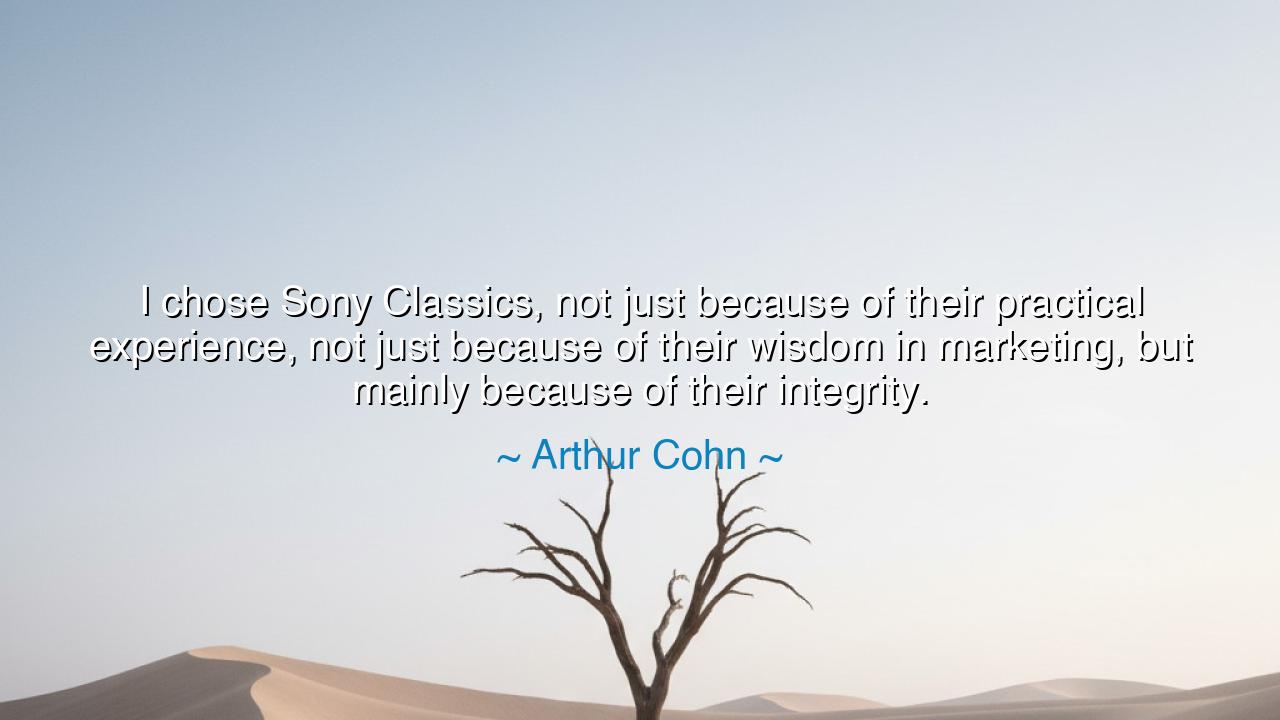
I chose Sony Classics, not just because of their practical
I chose Sony Classics, not just because of their practical experience, not just because of their wisdom in marketing, but mainly because of their integrity.






Arthur Cohn, master of cinema and teller of human stories, declared: “I chose Sony Classics, not just because of their practical experience, not just because of their wisdom in marketing, but mainly because of their integrity.” In these words we hear a truth older than empires—that among all the treasures men may seek in partners, it is integrity that outshines them all. Skill fades, cleverness shifts with the wind, but character endures like stone set against the tide.
The meaning is noble. Cohn acknowledges the value of experience and wisdom, for they are tools of success. Yet he raises a higher banner: integrity—the alignment of word and deed, the refusal to betray truth for gain. In a world where power often bends to profit and brilliance is wielded without conscience, Cohn’s choice proclaims that the soul of any enterprise is not its cunning but its honor.
History gives us a worthy example in George Washington, who could have made himself king after the American Revolution. He had the loyalty of the army, the adoration of the people, and the chance to seize power without rival. Yet he refused, laying down his command and later stepping aside after two terms as president. His integrity became a foundation for a republic built not on ambition, but on principle. Like Cohn’s words, Washington’s deed shows that the greatest trust belongs to those whose honor outweighs their desire for gain.
Cohn also teaches us that in art—as in life—integrity is the soil from which greatness grows. A film may dazzle with marketing or skill, but without truth, it is empty spectacle. Likewise, a business may rise with cunning, but without honor, it rots from within. Integrity sustains both art and enterprise, giving them the power not only to succeed but to endure.
Therefore, let the seeker of wisdom learn this: choose your companions not only for their talent, nor for their cleverness, but for their character. For talent without integrity may deceive, and cleverness without honor may destroy. But where integrity abides, trust flourishes, and through trust, true greatness is born. Cohn’s words, though rooted in the world of cinema, echo as counsel for all generations: the crown of any human endeavor is not brilliance, but integrity.






DK7E-Phan Duong Khoi
This quote feels deeply personal and principled. It suggests that Cohn values relationships that go beyond contracts and profits. I can’t help but wonder, though — can integrity and commercial success coexist, or do they often conflict in industries driven by money and recognition? Maybe this choice reflects a belief that ethical partnerships ultimately create more meaningful and lasting results.
MLDang My Linh
What strikes me here is the implicit critique of the film industry. By emphasizing integrity, it sounds like Arthur Cohn is indirectly acknowledging how rare it is. It makes me curious — how does one even gauge integrity in a corporate setting? In a business built on image and persuasion, what does it mean to truly operate with honesty and respect?
-836- Uyen Vy - 81
I find this statement fascinating because it suggests that true collaboration isn’t just about skill or experience, but about trust. It’s interesting that Arthur Cohn highlights integrity as the decisive factor. It makes me think — is integrity something that audiences can actually feel through the final product? Maybe the moral foundation of a partnership subtly shapes the authenticity of the art itself.
GHPham Tran Gia Huy
This quote really stands out because it places integrity above business strategy or commercial success. In an industry like film, where profit often drives decision-making, it’s refreshing to hear someone emphasize ethics. But I wonder — how common is it for creative professionals to prioritize values over visibility or revenue? Do you think integrity can still survive in today’s highly competitive entertainment world?